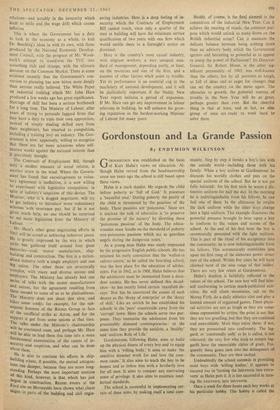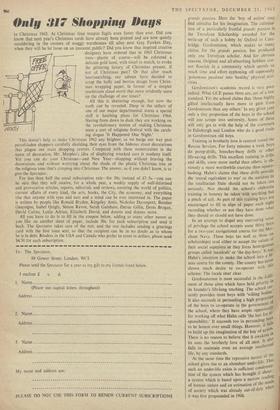Passion Gordonstoun and La Grande
By ENDYMION WILKINSON
GORDONSTOUN was established on the basis of Kurt Hahn's views on education. Al- though Hahn retired from the headmastership some ten years ago the school is still based upon these views.
Hahn is a stark dualist. He regards the child before puberty as 'full of God.' It possesses a 'beautiful soul.' During puberty the purity of the child is threatened by the passions of the body. These passions are 'poisonous.' Since sex is unclean the task of education is `to preserve the promise of the nursery' by diverting these `poisonous passions' of the body. The educa- tionalist must 'kindle on the threshold of puberty non-poisonous passions which act as guardian angels during the dangerous years.'
As a young man Hahn was vastly impressed by the progressive English public schools. He has retained his early conviction that the 'walled-in culture-centre,' as he called the boarding school, was the best place for the education of adoles- cents. For in 1962, as in 1908, Hahn believes that the adolescent must be immunised from a deca- dent society. He has never defined this decad- ence—he has merely listed certain 'manifold de- cays.' Nor has he uncovered the causes of such decays as the 'decay of enterprise' or the 'decay of skill.' Like an ostrich he has established his schools in the 'pure' countryside away from the `corrupt' town. Here the schools serve two pur- poses. They immunise the adolescent from his presumably diseased contemporaries : at the same time they provide the antidote, a 'healthy' and 'uniform Rule of Life.'
Gordonstoun, following Hahn, aims to build up the physical fitness of every boy and to equip him with a 'willing body.' It aims to make 'the sensitive dreamer work for and love the com- mon cause.' It also aims to teach the boy to be honest and to imbue him with a brotherly love for all men. It aims to conquer any enervating sense of privilege. It also aims to maintain intel- lectual standards.
The school is successful in implementing cer- tain of these aims, by making itself a total corn-
munity. Step by step it breaks a boy's ties with the outside world—including those with his family. When a boy arrives at Gordonstoun he discards his worldly clothes and puts on the special uniform of the school. But he is not yet fully initiated : for his first term he wears a dis- tinctive uniform for half the day. In the morning he is indistinguishable froni his fellows, he can feel one of them. In the afternoon he retains the dark uniform while the other boys change into a light uniform. This example illustrates the powerful pressure brought to bear upon a boy to conform to the values and norms of the school. At the end of his first term the boy is ceremonially presented with the light uniform. This is part of the ritual of his acceptance into the community; he is now indistinguishable from his fellows. This automatically establishes him upon the first rung of the elaborate power struc- ture of the school. Within five years he will have climbed most of the nine rungs of that ladder. There are very few rebels at Gordonstoun.
Hahn's dualism is faithfully reflected in the values of the school. The new boy will find him- self conforming to certain much-publicised acti- vities. He will climb mountains, sail on the Moray Firth, do a daily athletics stint and play a limited amount of organised games. These physi- cal activities are not as tough as they are some- times represented by critics; the point is not that they are too gruelling, but that they are continual and unavoidable. Most boys enjoy them; if not, they are pressurised into conformity. The lag- gard, or 'contentedly unfit' as he is called, is not tolerated; the very few who wish to remain lag- gards have the unenviable status of goats. Fre- quently these goats turn into the delinquents of the community. They are then sacked.
Undoubtedly the school succeeds in providing most boys with 'willing bodies.' It appears to succeed too in 'turning the introverts into extro- verts' as Hahn puts it. It is less successful in turn- ing the extroverts into introverts.
Once a week for three hours each boy works at his particular hobby. This hobby is called the grande passion. Here the 'boy of action' may find stimulus for his imagination. The culmina-
tion of a particularly fruitful grande passion is the Trevelyan Scholarship awarded for the write-up of such a hobby by Oxford or Cam- bridge. Gordonstoun, which makes so many claims for the grande passion, has produced only one Trevelyan scholar. And for obvious reasons. Original and all-absorbing hobbies can- not flourish in a community which spends so much lime and effort syphoning off supposedly 'poisonous passions' into 'healthy' physical acti- vities.
Gordonstoun's academic record is very poor indeed. What GCE passes there arc, are of a low standard. Yet the school claims that 'those highly gifted intellectually have more to gain from Gordonstoun than any others.' In any given year only a tiny proportion of the boys in the school will just scrape into university. Some of these will only get in with the help of the crammers in Edinburgh and London who do a good trade in Gordonstoun old boys.
Training in brotherly love is centred round the Rescue Services. For forty minutes a week boys do pump-drills, breeches-buoy drills or other life-saving drills. This excellent training in drills and skills, some more useful than others, is ob- viously a more worthwhile exercise than square- bashing. Hahn's claims that these drills provide the 'moral equivalent to war' or the antidote to the totalitarian State should not be taken .too seriously. Nor should the school's elaborate training in honesty be taken with any thing but a pinch of salt. As part of this training boys are encouraged to fill in slips of paper each night recording whether or not they have done
what they should or should not have done.
In an attempt to dispel any enervating sense of privilege the school accepts sonic thirty boys for a two-year navigational course for the Mer- chant Navy. These boys (as well as those on scholarships) tend either to accept the values of their social superiors or they form homogenous groups called `nauticals' or 'the day-boys.' It was Hahn's intention to make the school into a fit- ness centre for the county. The county has never shown much desire to co-operate with this scheme. The locals steer clear. Gordounstoun is most successful in the NIP ment of those aims which have held .priority kn its founder's life-long teaching. The school cer, tainly provides most boys with 'willing bodies. It also succeeds in persuading a high proportion,. of the boys to co-operate in the government 01 the school, where they have ample opportunity for working off what Hahn calls 'the lust for re- sponsibility.' It succeeds too in persuading b°L to be honest over small things. However, it fails to build up the imagination of the boy of acti°,11: There is no reason to believe that it awakens IHIO its sons the brotherly love of all men. ft als fails to maintain even an average intellectual life, by any standards. At the same time the repressive nature of the, school gives rise to an abundant under-life. Thal such an under-life exists is sufficient condemna- tion of the system which has brought it about a system which is based upon a narrow reading of human nature and an estimation of the needs of society which was already out-of-date whe' it was first propounded in 1908.





























 Previous page
Previous page